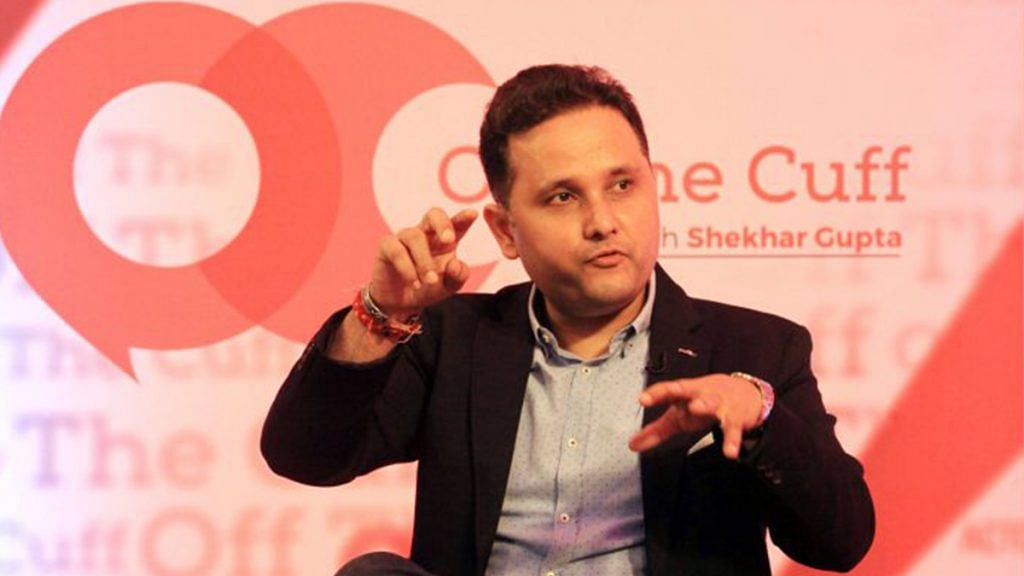New Delhi: The Ram Temple bhoomi poojan, which was held at Ayodhya on 5 August, was a civilisational moment in India, Amish Tripathi, the best-selling author of the Shiva Trilogy, said Monday.
In an interaction with ThePrint’s Editor-in-Chief Shekhar Gupta at the 100th edition of Off the Cuff, Tripathi also addressed the criticism that Prime Minister Narendra Modi was subjected to for participating in the ceremony. Many argued that the constitutional head of a secular country like India should not participate in religious events.
“While I am a diplomat, I can say that this is a civilisational moment. It gives a message to the world that we are alive, that we are Sanatan Dharma,” he said.
He added that community guilt and victimhood, however, served no purpose.
“It is necessary to address the pain from the past, especially for those of us who are traditionalists. But using that to engender hatred against someone today for something that could have been done 200 years ago or 1,000 years ago is something that will keep making us go back and forth. There’s a need for pragmatism in the middle,” said Tripathi.
Talking about the fact that the Ram Mandir was built on disputed territory where a mosque was destroyed, Tripathi mentioned the need to speak the truth.
According to him, “We have to speak the truth and find reconciliation without engendering hatred and saying no, nothing happened. We need to speak the truth and make peace with it.”
He also hailed the Supreme Court verdict that directed the central government to allocate separate land for a mosque.
Tripathi noted that the focus must now be on forging unity. “Land has been allocated for a mosque. We have to find a way to be united. From the Third Battle of Panipat, Indians have been defeated because of the divisions within us. But now we need to find unity.”
Also read: Let Ayodhya Ram Mandir be a reminder: Indian ancestors died for it, up to us to rebuild
‘Violence to protect country is justified’
Tripathi, whose books are based on Indian mythology and tradition, also talked about how India has a history of non-violence but also one that is not be afraid to strike back.
“While India has the oldest pacifist tradition in the world in Jainism — violence when it is defensive is justified. We won’t strike first but we will not be afraid to strike back. Ordinary citizens should be non-violent. But if the state becomes non-violent, we will be easy to conquer. Violence to protect the country is justified,” he said.
He also noted that the concept of secularism is a Western import and instead Indian culture promotes pluralism.
“Secularism comes from Western experience, it emerged as a rebellion against the church. Pluralism is the more appropriate word for India. Dharma is not religion. It is the right way to live. Indian approach implies equal respect for all religions and Indian tradition has been pluralism,” said Tripathi.
This pluralism, according to him, makes India more of a ‘Chanakyan state’ rather than an ‘Ashokan state’. “Chanakyan state is a minimal state which includes pluralism. On the other hand Ashokan state interferes in everything and there’s no pluralism.”
On whether Hindutva has been misinterpreted with a political connotation today, Tripathi said Hindutva simply means “the essence of Hinduism as the word is a conjunction of Hindu and tatva, which means essence”.
Also read: Modi redefined secularism with Ram Mandir as Hindu voters were fed up of Sonia-Left version
‘Praising Aurangzeb like praising Hitler’
In the conversation, Tripathi talked about the need to rebrand ‘Muslim invasion’ in India.
“If you don’t call the British colonial rule Christian rule, then why do you call the Turkish colonial rule Islamic rule? The Turks did not just destroy temples in India but they did so everywhere. We must see the past with unbiased truthful eyes,” he said.
He added that truth and reconciliation is important for Indians to find closure.
“Praising Aurangzeb in India is like praising Hitler in Israel. It’s not just wrong, it is cruel. We need to find a middle path to find closure,” he said.
According to Tripathi, India needs to accept these truths and find a way to move on to become a global power.
As a writer, he also said he believes in absolute freedom of expression. “For any society to be stable, free and innovative, it must celebrate freedom of expression. I’ve been a victim of the lack of freedom of expression. I faced challenges to get my first book published.”
Ultimately, Tripathi said, any society must celebrate freedom of expression for it to be free and stable.
“For that, we need to build capacity by decreasing the burden on our courts so that violations of freedom of expression can be addressed. If we build court capacity, our GDP will also improve, crime rate will fall and our freedom of expression will be protected,” he added.
Also read: Whose Ram Rajya does Ayodhya temple bring — Gandhi’s or Modi’s? Ambedkar can answer
